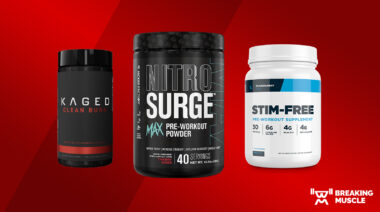I am a bartender, so like to think I know a thing or two about great cocktails. You need a balance of flavors, the right amount of dilution, and please – for the love of Zeus – keep that smashed fruit pulp out of my Old Fashioned.
When it comes to mixing the perfect workout supplementation cocktail, the principles are similar. Use the right balance of the right things and your pre-, post-, and intra- workout results can soar. Everyone is different, yes – but I have three supplement recommendations I believe can benefit each and every exerciser regardless of age, training level, or gender.
Food Comes First
Before we talk about supplements, I want to get this out of the way: if you are struggling with your nutrition, get that in order first. Seriously. Nothing will give you better results than putting quality food-based nutrients in your body.
I don’t care if you are a spiritual tree vegan or whether you ketonosize your paleos or whatever. Just eat real food more often than not. If you have to think hard about when was the last time you had some sort of plant or a protein that did not come from a canister, stop reading and reevaluate. I’ll still be here.
“Before we talk about supplements, I want to get this out of the way: if you are struggling with your nutrition, get that in order first. Seriously.”
Before you worry about supplements, always make sure you are eating a good amount of nutrient-dense foods, drinking enough water, and sleeping enough. Those things are the most important aspects of health, recovery and results.

The Big Three Supplements
So with the basic stuff aside, let’s talk about supplements. Beneath all of our dietary preferences, exercise routines, expensive yoga leggings, and Facebook profiles, we all pretty much represent the same mish-mash of human cellular organization.
With that in mind, here are my three recommended ingredients for your supplement cocktail.
Creatine
First, although creatine is an ergogenic aid, it is not a steroid. Creatine is an amino acid derivative and steroids are hormones. Although they may influence each other, they play two totally different roles in cellular metabolism.
Second, whether you have a penis, a vagina, or if you do not identify with either of those things, your body needs and uses creatine to think and move. It is a genderless supplement even if we are led to believe, through convention, that it is “something that guys take.”
RELATED: The Crash Course on Creatine
Creatine is found in meat and fish and is also manufactured in small amounts by our body. It is stored in a form that makes it readily available for energy uptake during our first and most intense bouts of movement (sprinting, snatching, jumping, kicking a soccer ball, getting up out of a chair). The body generally has a much higher concentration of stored creatine than ATP. Therefore, the more creatine the body has stored, the more ATP can be produced in a given movement.
“Beneath all of our dietary preferences, exercise routines, expensive yoga leggings, and Facebook profiles, we all pretty much represent the same mish-mash of human cellular organization.”
Now, there are obviously physiological limitations to everything. I am not suggesting that taking an infinite amount of creatine will give you the power to punch through a cement wall. What I am saying is that if you are a human, and you can benefit from more efficient energy production (which I think is everyone), then creatine is for you.

As far as dosing, there is a ton of conflicting advice as to when/how/when not/how much creatine to take. Start with a little bit – a couple grams or two per day. Allow some time for your body to beef up its creatine stores. If you haven’t noticed a change in your performance, try a little more. If you experience any sort of GI distress, use a little less. Don’t be afraid to experiment a little. Unless you take a brownie batch-sized amount every day, research shows that creatine is entirely harmless.
Fish Oil
I am sure you have heard you should take fish oil and that it prevents disease and knows three languages and all that, but do you know why it helps you? I could sit down right now and start research for an entire book on the benefits of fish oil, but I think we can keep it simple and focus on a very attractive benefit of this supplement: fish oil helps you burn fat.
“I think we can keep it simple and focus on a very attractive benefit of this supplement: fish oil helps you burn fat.”
Typing the words “helps you burn fat” makes me want to go wash my hands because it is probably the most overused phrase in fitness, but in this case, it is true. Fish oil is a source of omega-3 fatty acids, something that isn’t readily produced in our bodies.
READ MORE: Want to Get Strong and Lean? Take Fish Oil
In your cells, there are little garbage men called lysosomes and cleaning ladies called perioxisomes. Both function to make sure your cells remain unaffected by toxins and excessive growth. Specifically, perioxisomes aid in the breakdown of fatty acids. Omega-3s cause an increase in the amount of fatty acids that are catabolized during activity. In that case, you receive more bang-for-your-buck fat utilization not only when you exercise, but also when you are just sitting around. Yes, plz.
Just try and get a higher-grade fish oil if you have the funds available. Fish burps are the worst.
Branched Chain Amino Acids
BCAAs help with protein resynthesis and preventing muscle tissue breakdown. Here is the thing: we should ideally be getting all of our BCAAs from dietary protein. If you are anything like me, though, eating substantial meals before or after working out can make you a little queasy.
Furthermore, food needs time to be broken down into its constituent substrates. It can be difficult to figure out exactly when to eat around your workout. At the risk of sounding bro-sciencey, when it comes to feeling energetic for your workout and preventing excessive soreness, timing is everything.
TO CONSIDER: BCAAs: What They Are and Why to Take Them
To prevent excessive fatigue and muscle breakdown in your body during sport and exercise, you need to have something in your system before and/or after your workout. Furthermore, you need something your digestive system can tolerate. Not everyone can tolerate whey or other types of synthetic protein. Enter BCAAs!
BCAAs are easily and readily assimilated into your body and, if you find a good brand, can be quite tasty. Like Beyoncé, I’ve been drankin’ watermelon. You will be more energetic through your workout, you will recover faster, and there is little chance for an unpleasant GI interaction. In my book, these are all wins.

Putting It All Together
All of these supplements are well-documented and researched on PubMed. Check it out. It is interesting and also a great way to learn about your own body and how it works. I think they should have an Olympics for all of the physically fit rats that are being created in labs.
“To prevent excessive fatigue and muscle breakdown in your body during sport and exercise, you need to have something in your system before and/or after your workout.”
Overall, I encourage you to experiment with this combination of supplements along with adequate rest and hydration and a nutrient-dense diet. Experiment with what works best for you and enjoy the benefits of safe and effective supplementation.
References:
1. Berardi, PhD, John, and Ryan Andrews. “Cell Structure and Function.” In The Essentials of Sport and Exercise Nutrition. Precision Nutrition, 2014.
2. Brosnan, John, and Margaret Brosnan. “Branched-Chain Amino Acids: Enzyme and Substrate Regulation.” The Journal of Nutrition 136, no. 1 (2006): 207S-11S. Accessed December 1, 2014.
3. Hargreaves, Mark. “Exercise Physiology: Understanding the Athlete Within.” Class Lecture, July 1, 2014.
All photos courtesy of Shutterstock.






